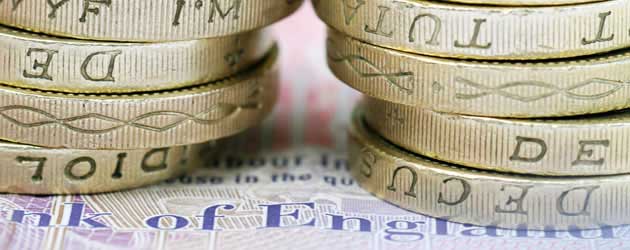
Over the past two days the Pound has improved by around 1.6 cents against the Euro, reaching a 10-day high of 1.1600 (GBP/EUR). During this time Sterling has also rallied strongly against the US Dollar, the Canadian Dollar, the Australian Dollar, and the New Zealand Dollar.
However, the rallies appear to be motivated by profit-taking stances rather than by any sense of relief for the embattled UK economy. With GBP/USD and GBP/CAD hitting 2.5-year lows earlier on in the week, and GBP/AUD and GBP/NZD both trading close to all-time record lows, profit-hungry traders have bought up the Pound despite its relatively bearish near-term outlook.
In terms of downside pressure, the Pound is faced with the unnerving prospect of the UK economy sliding into an unprecedented and reputation-damaging triple-dip recession. Gross Domestic Product contracted by -0.3% in the final three months of 2012, and another negative GDP print is all that stands between Britain and the previously unthinkable: a triple-dip recession.
Purchasing Managers Indexes for Construction (46.8) and Manufacturing (47.9) have printed in the red so far this year, and extremely weak Industrial Production (-2.9%) and Manufacturing Production (-3.0%) figures released earlier this week have done little to alleviate fears that economic output is failing to grow this quarter.
On top of this Retail Sales (-0.6%) are also sliding, and many high street stores have collapsed into administration already this year. The damaging cocktail of low wage growth (0.4%) coupled with overshooting inflation (2.7%) has led to the shutdown of established household names such as: HMV, Blockbusters, and Jessops. Naturally this destructive combination has also taken its toll on the British financial system as consumer-spending power has been diminished.
Next week will see the Chancellor of the Exchequer George Osborne release his 2013 UK budget. The credit rating agencies will be on standby to make sure that the government does not steer too far away from its fiscal consolidation targets; any discrepancies and Fitch and Standard & Poor’s could join Moody’s in stripping Britain of its prized AAA credit rating.
Falling on the same day – Wednesday March 20th – the Bank of England will release the Minutes from their latest Monetary Policy Committee meeting. The report is expected to show that members voted 6-3 against further asset purchases in March, but any indication towards further quantitative easing measures will be sure to weigh on the Pound.
In terms of upside potential, the UK Consumer Price Index is predicted to grow to 2.8%, which could deter the BoE from embarking on another round of QE. But as I stated earlier, this is a double-edged sword because overshooting inflation is detrimental to the real economy. It is also important to consider that the UK Central Bank have recently changed their tune, and are now more open to – or at least more accepting of – higher rates of inflation, meaning that an elevated print may not necessarily convince the MPC to hold off on monetary easing.
The one true positive influence on Sterling at the moment is the UK’s dominant Service Sector. Output from the Services Industry accounts for a whopping 70% of UK GDP, and luckily for the UK government it is the only primary sector that is not in decline. The latest Services PMI printed at 51.8, but it will have to remain at a similarly positive level throughout the rest of Q1 if the UK is to avoid a third recession since the financial crisis struck in 2008.
With little economic data of major significance between now and next Wednesday the Pound could retrace some of its profound losses so far this year on the currency market against the Euro, the US Dollar, the Canadian Dollar, the Australian Dollar, and the New Zealand Dollar. However, Wednesday is crunch time, and it is also possible that we will see GBP get off to a soft start next week as nervous investors abandon Sterling in the build-up to the UK budget and the BoE Minutes report.

Comments are closed.